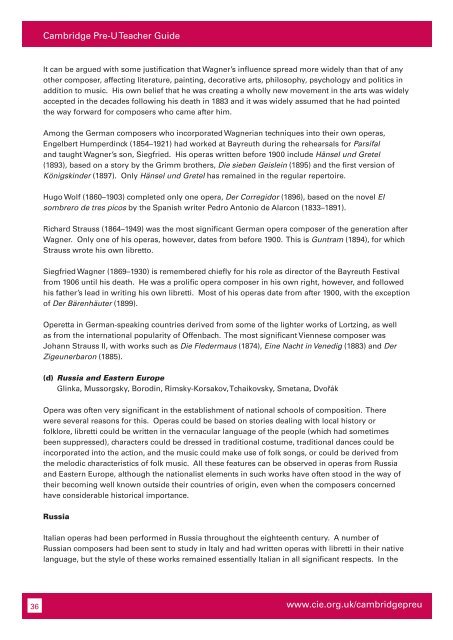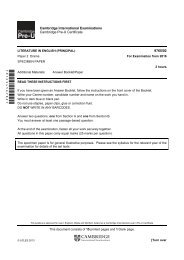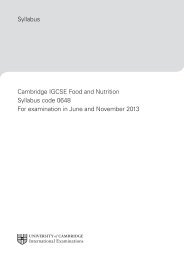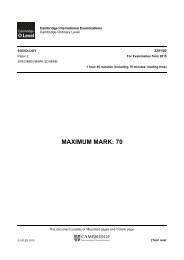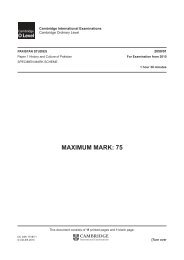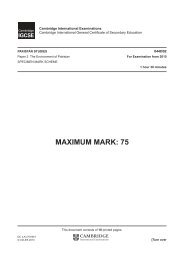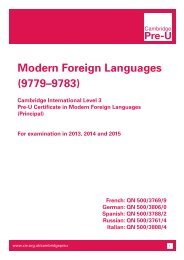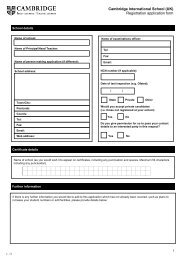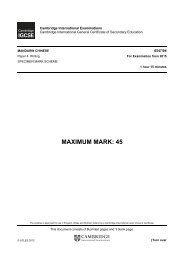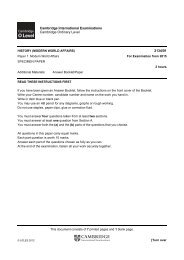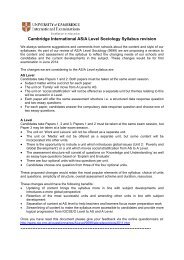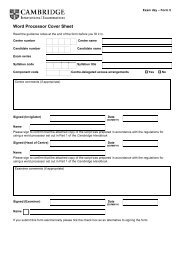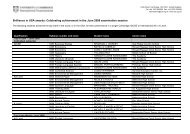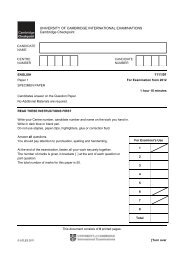Teacher's Guide Cambridge Pre-U MUSIC Available for teaching ...
Teacher's Guide Cambridge Pre-U MUSIC Available for teaching ...
Teacher's Guide Cambridge Pre-U MUSIC Available for teaching ...
You also want an ePaper? Increase the reach of your titles
YUMPU automatically turns print PDFs into web optimized ePapers that Google loves.
36<br />
<strong>Cambridge</strong> <strong>Pre</strong>-U Teacher <strong>Guide</strong><br />
It can be argued with some justification that Wagner’s influence spread more widely than that of any<br />
other composer, affecting literature, painting, decorative arts, philosophy, psychology and politics in<br />
addition to music. His own belief that he was creating a wholly new movement in the arts was widely<br />
accepted in the decades following his death in 1883 and it was widely assumed that he had pointed<br />
the way <strong>for</strong>ward <strong>for</strong> composers who came after him.<br />
Among the German composers who incorporated Wagnerian techniques into their own operas,<br />
Engelbert Humperdinck (1854–1921) had worked at Bayreuth during the rehearsals <strong>for</strong> Parsifal<br />
and taught Wagner’s son, Siegfried. His operas written be<strong>for</strong>e 1900 include Hänsel und Gretel<br />
(1893), based on a story by the Grimm brothers, Die sieben Geislein (1895) and the first version of<br />
Königskinder (1897). Only Hänsel und Gretel has remained in the regular repertoire.<br />
Hugo Wolf (1860–1903) completed only one opera, Der Corregidor (1896), based on the novel El<br />
sombrero de tres picos by the Spanish writer Pedro Antonio de Alarcon (1833–1891).<br />
Richard Strauss (1864–1949) was the most significant German opera composer of the generation after<br />
Wagner. Only one of his operas, however, dates from be<strong>for</strong>e 1900. This is Guntram (1894), <strong>for</strong> which<br />
Strauss wrote his own libretto.<br />
Siegfried Wagner (1869–1930) is remembered chiefly <strong>for</strong> his role as director of the Bayreuth Festival<br />
from 1906 until his death. He was a prolific opera composer in his own right, however, and followed<br />
his father’s lead in writing his own libretti. Most of his operas date from after 1900, with the exception<br />
of Der Bärenhäuter (1899).<br />
Operetta in German-speaking countries derived from some of the lighter works of Lortzing, as well<br />
as from the international popularity of Offenbach. The most significant Viennese composer was<br />
Johann Strauss II, with works such as Die Fledermaus (1874), Eine Nacht in Venedig (1883) and Der<br />
Zigeunerbaron (1885).<br />
(d) Russia and Eastern Europe<br />
Glinka, Mussorgsky, Borodin, Rimsky-Korsakov, Tchaikovsky, Smetana, Dvořák<br />
Opera was often very significant in the establishment of national schools of composition. There<br />
were several reasons <strong>for</strong> this. Operas could be based on stories dealing with local history or<br />
folklore, libretti could be written in the vernacular language of the people (which had sometimes<br />
been suppressed), characters could be dressed in traditional costume, traditional dances could be<br />
incorporated into the action, and the music could make use of folk songs, or could be derived from<br />
the melodic characteristics of folk music. All these features can be observed in operas from Russia<br />
and Eastern Europe, although the nationalist elements in such works have often stood in the way of<br />
their becoming well known outside their countries of origin, even when the composers concerned<br />
have considerable historical importance.<br />
Russia<br />
Italian operas had been per<strong>for</strong>med in Russia throughout the eighteenth century. A number of<br />
Russian composers had been sent to study in Italy and had written operas with libretti in their native<br />
language, but the style of these works remained essentially Italian in all significant respects. In the<br />
www.cie.org.uk/cambridgepreu


